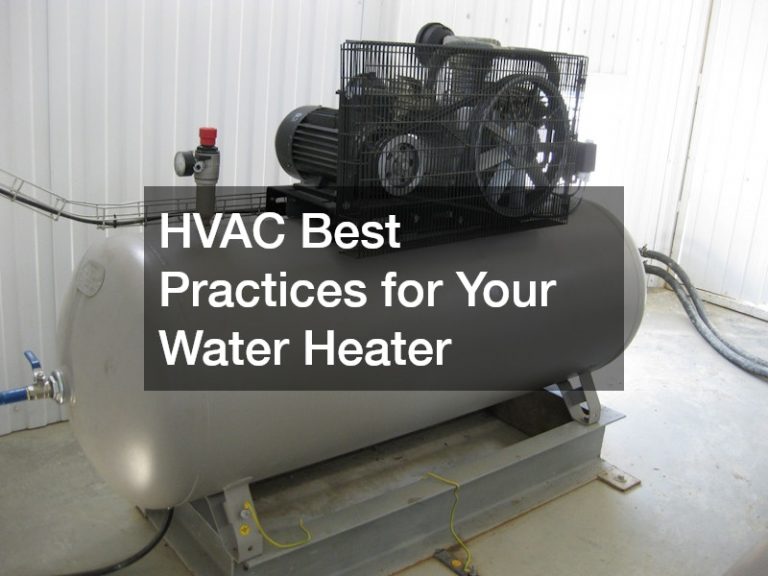Water heaters are a vital component of any household, providing hot water for various daily tasks and ensuring comfort year-round. To maintain the efficiency and longevity of your water heater system, it is essential to implement best practices recommended by HVAC professionals and experts in the field. This article will delve into the key aspects of water heater maintenance, from annual inspections to identifying common issues and knowing when it’s time for a replacement.
Understanding Your Water Heater System
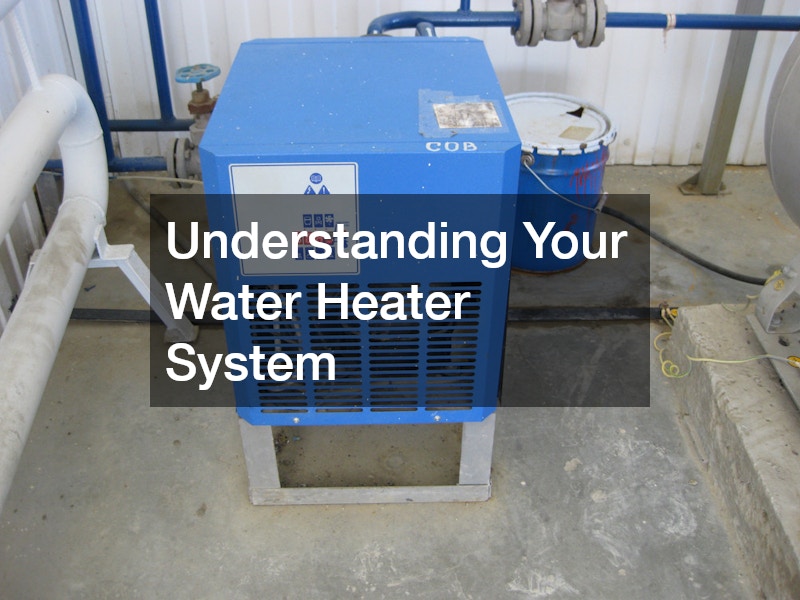
When it comes to understanding your water heater system, it is crucial to familiarize yourself with the different components and how they function together. Local HVAC companies can provide valuable insights into the specifics of your water heater model and offer guidance on optimal usage practices. By gaining knowledge about your system, you can effectively troubleshoot minor issues and ensure that your water heater operates efficiently for years to come.
Additionally, working with a reputable HVAC equipment company can help you source high-quality parts and accessories for your water heater, ensuring that it functions at its best capacity. By investing in top-of-the-line components and materials, you can enhance the performance of your water heater and minimize the risk of breakdowns or malfunctions.
Implementing best practices for your water heater system not only improves its efficiency but also contributes to energy conservation and cost savings in the long run. By partnering with local plumbers and HVAC professionals, you can access expert advice on maintaining your water heater and maximizing its lifespan.
Annual Inspections: A Must for Long-Term Efficiency
Scheduling annual inspections for your water heater is a crucial step in ensuring its long-term efficiency and performance. HVAC equipment company professionals can conduct comprehensive check-ups on your system, identifying any potential issues or areas of concern. By proactively addressing these issues, you can prevent costly repairs or replacements down the line.
During annual inspections, HVAC experts will assess the overall condition of your water heater, inspecting the tank, valves, and connections for signs of wear and tear. By detecting minor leaks or corrosion early on, you can avoid water damage and extend the lifespan of your water heater. Regular maintenance and inspections are key components of HVAC best practices, promoting the efficient operation of your water heater and minimizing the risk of unexpected breakdowns.
By investing in annual inspections and routine maintenance for your water heater, you can enjoy peace of mind knowing that your system is operating at peak performance. HVAC professionals can help you develop a maintenance schedule tailored to your specific needs and ensure that your water heater remains in optimal condition throughout its lifespan.
Flushing the Tank: Preventing Sediment Build-Up
One of the most common issues that water heaters face is sediment build-up within the tank, which can lead to reduced efficiency and potential damage to the system. Local plumbers recommend flushing the tank regularly to remove sediment and mineral deposits that accumulate over time. By draining the tank and flushing it out, you can prevent clogs and blockages that impede the flow of hot water.
HVAC best practices emphasize the importance of tank flushing as a preventative measure to maintain the performance and efficiency of your water heater. By removing sediment build-up, you can improve the heating capacity of the system and reduce energy consumption. Additionally, flushing the tank allows for better water quality and helps extend the lifespan of your water heater.
Local plumbing services can assist you in flushing your water heater tank and ensuring that it operates at optimal efficiency. By incorporating tank flushing into your regular maintenance routine, you can mitigate the risk of sediment-related issues and preserve the functionality of your water heater for years to come.
Checking the Anode Rod: Protecting Your Tank
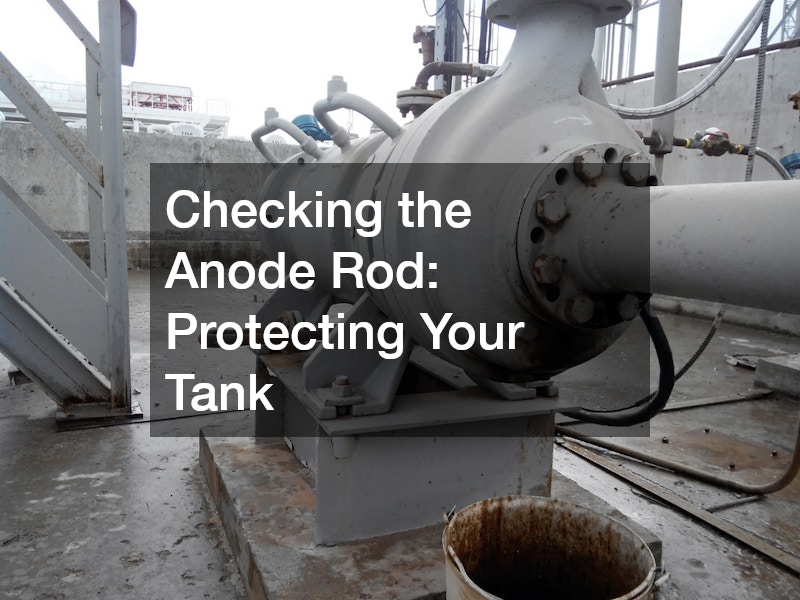
Another essential maintenance task for water heaters is checking the anode rod, a sacrificial component that protects the tank from corrosion and extends its lifespan. Local plumbing services recommend inspecting the anode rod annually and replacing it if necessary to prevent rust and deterioration. By monitoring the condition of the anode rod, you can safeguard your water heater against internal damage.
HVAC best practices dictate that the anode rod should be checked regularly to ensure that it is functioning effectively in protecting the tank from corrosion. Over time, the anode rod may deteriorate due to exposure to minerals and contaminants in the water, necessitating replacement to maintain the integrity of the tank. By proactively maintaining the anode rod, you can prevent costly repairs and prolong the life of your water heater.
Local plumbers specialize in inspecting and replacing anode rods, providing expert guidance on preserving the structural integrity of your water heater. By partnering with experienced professionals, you can receive timely maintenance services that enhance the efficiency and longevity of your water heater system.
Setting the Optimal Temperature
Properly setting the temperature on your water heater is essential for maximizing efficiency and ensuring safe operation. Tankless water heaters, in particular, require precise temperature adjustments to deliver hot water on demand without wasting energy. HVAC best practices recommend setting the temperature between 120-140 degrees Fahrenheit to balance comfort and efficiency.
Local HVAC companies can assist you in calibrating the temperature settings on your water heater to meet your household’s hot water needs while minimizing energy consumption. By fine-tuning the temperature controls, you can prevent overheating and reduce the risk of scalding, maintaining a safe and comfortable environment. Setting the optimal temperature is a simple yet effective way to optimize the performance of your water heater system.
By investing in a tankless water heater with adjustable temperature settings, you can customize the hot water output to suit your preferences and usage patterns. With the guidance of HVAC professionals, you can set the temperature accurately and efficiently, ensuring consistent performance and energy savings over time.
Installing Insulation for Improved Efficiency
To enhance the energy efficiency of your water heater, consider installing insulation around the tank and pipes to minimize heat loss. Plumbing companies offer insulation services that help retain heat within the system, reducing standby heat loss and improving overall performance. By insulating your water heater, you can optimize its efficiency and lower your energy bills.
HVAC best practices recommend insulating both the tank and hot water pipes to maintain consistent temperatures and reduce the workload on the water heater. By preventing heat loss through proper insulation, you can extend the lifespan of the system and improve its efficiency. Investing in insulation is a cost-effective way to save energy and enhance the performance of your water heater.
Local plumbing services can assess your water heater system and recommend insulation solutions tailored to your specific requirements. By working with experienced professionals, you can ensure that the insulation is installed correctly and effectively improves the energy efficiency of your water heater. Insulation is a valuable investment that pays off in terms of reduced energy consumption and increased operational efficiency.
Water Heater Location: Ensuring Proper Ventilation
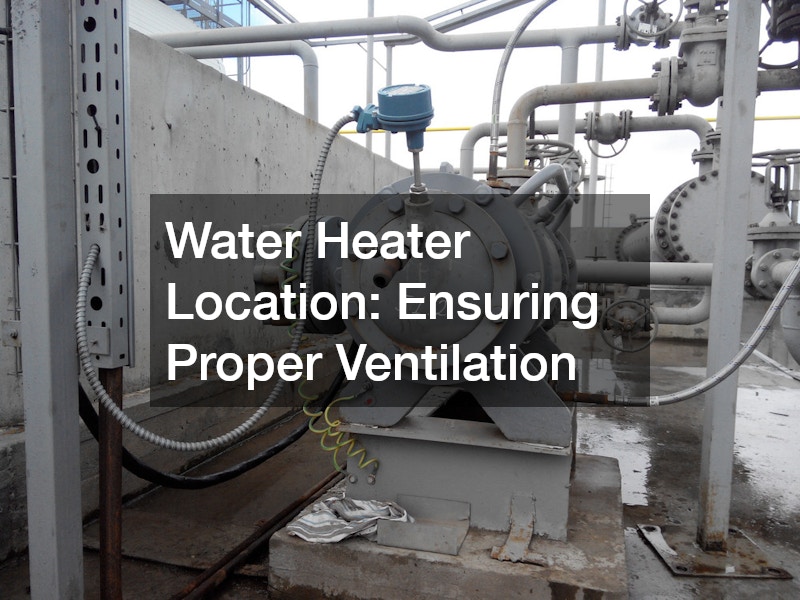
The location of your water heater plays a crucial role in its performance and safety, as proper ventilation is essential to prevent gas build-up and maintain air quality. Water heater repair experts stress the importance of placing the unit in a well-ventilated area with sufficient airflow to dissipate combustion byproducts. By ensuring proper ventilation, you can protect your household from potential safety hazards.
HVAC best practices dictate that water heaters should be installed in areas with ample ventilation, such as utility rooms or outdoor spaces with adequate airflow. Avoid placing the water heater in confined or poorly ventilated areas, as this can pose a risk of carbon monoxide buildup and other dangers. Proper ventilation is essential for the safe and efficient operation of your water heater system.
Water heater companies can provide guidance on the ideal location for installing your unit and ensuring proper ventilation to meet safety standards. By consulting with experts in the field, you can address ventilation concerns and create a safe environment for your water heater. Proper ventilation is a fundamental aspect of water heater maintenance that should not be overlooked.
Regularly Testing the Pressure Relief Valve
The pressure relief valve is a critical safety component of water heaters, designed to release excess pressure and prevent tank rupture in case of high pressure or temperature. Water heater companies recommend testing the pressure relief valve periodically to ensure it is functioning correctly and able to discharge water as needed. By testing the valve regularly, you can safeguard against potential safety hazards and maintain the integrity of your water heater.
HVAC best practices emphasize the importance of testing the pressure relief valve at least once a year to verify its operation and reliability. A faulty or malfunctioning valve can lead to hazardous conditions and compromise the safety of your water heater system. By conducting routine tests, you can identify issues early on and take necessary action to address any concerns.
Water heater repair professionals have the expertise to evaluate the pressure relief valve and make any adjustments or repairs necessary to ensure proper functionality. By entrusting your water heater maintenance to experienced technicians, you can rest assured that safety measures are in place to protect your home and family. Regular testing of the pressure relief valve is a critical step in maintaining the safety and efficiency of your water heater.
Transitioning to Energy-Efficient Models
As technology continues to evolve, homeowners have the opportunity to upgrade to energy-efficient water heater models that offer superior performance and sustainability. Plumbing repair specialists recommend transitioning to energy-efficient units that utilize advanced technologies to reduce energy consumption and lower operating costs. By investing in energy-efficient water heaters, you can enjoy long-term savings and environmental benefits.
HVAC best practices advocate for the adoption of energy-efficient water heater models that meet ENERGY STAR® certification standards and deliver exceptional performance. These units are designed to minimize energy waste and maximize efficiency, providing hot water on demand while lowering utility bills. By upgrading to energy-efficient models, you can contribute to environmental conservation and enhance the sustainability of your home.
Plumbing companies can assist you in selecting and installing energy-efficient water heater systems that align with your budget and efficiency goals. By partnering with professionals who specialize in green technology, you can make a positive impact on your energy consumption and reduce your carbon footprint. Transitioning to energy-efficient models is a proactive step towards a more sustainable and cost-effective water heating solution.
Common Water Heater Issues and How to Address Them
Despite regular maintenance and best practices, water heaters may experience common issues such as leaks, insufficient hot water, or strange noises. Plumbing companies are well-equipped to diagnose and address these issues, providing prompt solutions to restore the functionality of your water heater. By addressing common problems promptly, you can prevent further damage and ensure the efficient operation of your system.
HVAC best practices recommend contacting plumbing professionals at the first sign of water heater issues, as delaying repairs can lead to more extensive damage and costly repairs. Experienced technicians can identify the root cause of the problem and recommend appropriate repairs or replacements to resolve the issue. By addressing common water heater issues proactively, you can avoid disruptions to your hot water supply and maintain system performance.
Plumbing repair services offer comprehensive solutions for common water heater issues, including leak repairs, heating element replacements, and tank flushing. By enlisting the expertise of skilled professionals, you can address problems efficiently and effectively, restoring the functionality of your water heater. Timely repairs and maintenance are key components of HVAC best practices for preserving the efficiency and lifespan of your water heater.
Signs It’s Time to Replace Your Water Heater
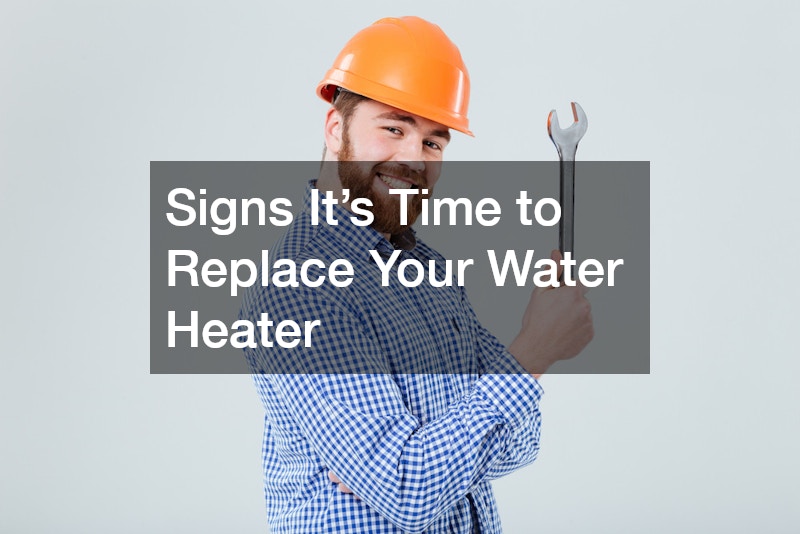
Over time, water heaters may reach the end of their lifespan and exhibit signs of wear and inefficiency that indicate the need for replacement. HVAC best practices stress the importance of recognizing key warning signs such as frequent breakdowns, rust-colored water, or unusual noises emanating from the system. If you notice these indicators, it may be time to consider replacing your water heater.
Local HVAC companies can conduct assessments of your water heater system to determine if it is nearing the end of its lifespan and recommend suitable replacement options. By upgrading to a new, energy-efficient water heater, you can enjoy improved performance, lower operating costs, and enhanced reliability. Replacing an aging water heater is a proactive measure that ensures your hot water needs are met efficiently and dependably.
When deciding to replace your water heater, consult with a plumbing company to explore different models and features that align with your household’s requirements. By investing in a high-quality water heater and professional installation services, you can benefit from long-term savings and peace of mind. Recognizing the signs that it’s time to replace your water heater is a crucial step in maintaining a comfortable and functional home environment.
Maintaining the efficiency and performance of your water heater system requires adherence to HVAC best practices and regular maintenance routines. By working with local HVAC companies, plumbing services, and water heater repair professionals, you can implement preventative measures, address common issues, and ensure the longevity of your water heater. From annual inspections to tank flushing, checking the anode rod, and setting the optimal temperature, each maintenance task plays a vital role in maximizing the efficiency and durability of your water heater. By incorporating these best practices into your routine, you can enjoy reliable hot water supply, lower energy bills, and a comfortable home environment for years to come.
